Eczema, also called atopic dermatitis, is not one specific skin disease but an umbrella term describing a group of inflammatory skin conditions that produce rash-like symptoms.
Eczema damages the outermost layer of your skin, which defends your body against harmful environmental factors. Eczema can make your skin more sensitive and prone to infections and dryness.
This skin condition is incredibly common, with more than 31 million Americans affected by some form of eczema (atopic dermatitis). It does not harm your body and is not contagious – in other words, you cannot "catch" eczema from someone who has it.
While there is no cure for eczema, there are treatments to manage and alleviate symptoms.
Divi offers hair care products such as Divi's Scalp Serum, which is gentle on sensitive skin and helps to restore moisture to dry, itchy scalps.
What are the Different Types of Eczema?
There are seven types of eczema, most of which cause dry, itchy skin and rashes on the face, hands, feet, inside the elbows and behind the knees. Let's take a look at the different types of eczema.
Atopic Dermatitis
Atopic dermatitis, sometimes referred to as atopic eczema, is the most common form of eczema. It causes inflamed, itchy and dry skin. While typical in infants and small children, it can occur at any age. Atopic dermatitis can exist on its own or alongside other types of eczema.
Contact Dermatitis
Contact dermatitis is a common skin condition often affecting people who come in contact with chemicals, allergens or irritants. There are two types of this skin condition: irritant contact dermatitis and allergic contact dermatitis.
Unlike other forms of eczema, contact dermatitis doesn't have a relationship with seasonal allergies or hay fever.
Dyshidrotic Eczema
Dyshidrotic eczema, also known as pompholyx, is another common type of eczema that causes a sudden rash of small, itchy blisters on the palms and along the sides of the fingers. It primarily affects adults between 20-40 years old and appears in those who already suffer from other forms of eczema or seasonal allergies.
Seborrheic Dermatitis
Seborrheic dermatitis is an inflammatory form of eczema that commonly affects the scalp. This type of eczema causes flaky, dry skin that itches and can also affect the chest, back, armpits, groin and face.
Discoid Eczema
Discoid eczema, also known as nummular eczema, is a chronic condition characterized by circular-shaped patches of blistered or inflamed skin that appear scaly. It commonly occurs on the lower legs, torso and forearms.
Stasis Dermatitis
Stasis dermatitis, also called varicose eczema, causes skin discoloration on the legs, which appears similar to varicose veins. This type of skin condition occurs when you have poor circulation or blood flow in the legs.
Neurodermatitis
Neurodermatitis is characterized by chronic itching or scaling. Unlike other forms of eczema, this skin condition does not appear in multiple areas across the body but instead stays limited to one or two areas of affected skin.
What are the Main Causes of Eczema?

While it is unknown what exactly causes eczema, the American Academy of Dermatology suggests it is a complex skin disease likely caused by an interaction between genetic and environmental factors.
Eczema is likely caused by the following:
- Immune system – People with eczema tend to have an overactive immune system response to allergens and irritants.
- Genetics – People are more likely to develop eczema if they have a family history of dermatitis. They are also at higher risk if they have hay fever, asthma or other allergies.
Also, there might be a change in genes that helps maintain the skin's barrier function – without this protein, the skin is less able to protect the skin from irritants and allergens.
- Environment – Environmental factors such as cold and dry weather, dampness, humidity and more specific things such as pollen, pet dander, harsh soaps, dust mites and certain fabrics can trigger atopic dermatitis symptoms.
- Stress – Emotional stress can trigger or worsen eczema. Stressing over your eczema, dealing with stressful situations, or having anxiety or depression can affect the severity.
Common Signs and Symptoms of Eczema
Eczema symptoms vary depending on the type of eczema you have. For most people, the main symptom is itching. Anything that causes an itch can lead to scratching, often triggering a flare-up. This is known as the "itch-scratch cycle."
Typical eczema (atopic dermatitis) symptoms are:
- Itchy, dry, rough, flaky, inflamed and irritated skin
- Small, raised bumps that may be filled with fluid and leak when you scratch them
- Raw, sensitive skin from scratching
- Rash on swollen skin that varies in color depending on your skin color
Who is at Risk of Getting Eczema?
Many triggers can cause eczema. While some people are more prone to developing and repeatedly experiencing this skin condition, eczema can affect anyone. It also usually begins in childhood, but anyone at any age can get it.
Studies show you're more at risk of developing eczema if you're:
- Female
- Diagnosed with asthma or hay fever
- Have a family history of dermatitis, asthma or hay fever
- Have extremely dry skin and come in contact with allergic substances
- Have certain food allergies
- Living in areas with high humidity or cold, dry weather
Moreover, environmental triggers can contribute to the intensity, severity and frequency of an eczema flare-up if you're genetically predisposed to this skin condition.
How to Prevent Eczema Flares
The triggers for atopic dermatitis vary widely from person to person. The best way to prevent eczema flares is to identify and avoid irritants that trigger symptoms and to stop the "itch-scratch cycle."
Even if you haven't identified your specific eczema triggers, there are a couple of actions you can take to prevent eczema flare-ups, including:
- Following a comprehensive skincare routine – Moisturize your skin daily with a rich, oil-based cream or ointment to form a protective barrier against the elements. Apply the cream right after you get out of the shower or bath to seal in the moisture.
- Use Divi products – If you are prone to scalp eczema, then using Divi's Shampoo, Conditioner, and Scalp Serum can help you to manage the symptoms on your scalp.
- Bathing smart – Use fragrance-free detergents, cleansers, makeup and other skincare products, and shower in lukewarm water rather than hot water – as hot water tends to dry out the skin.
- Following a healthy diet and drinking lots of water – Certain foods can worsen your symptoms, so it's essential to identify and avoid them. Also, drinking lots of water helps maintain skin moisture.
- Wearing loose-fitting clothes – Lightweight, soft, and breathable clothing helps keep you cool and prevents rubbing and irritating the skin.
- Investing in a humidifier – Humidifiers can help dry skin by restoring moisture in the air.
- Avoiding stress – While stress can be the most complex trigger to manage, consider seeing a psychiatrist for medication or a therapist for counseling if you're experiencing poor mental/emotional health symptoms.
Eczema vs. Psoriasis: What's the Difference?
The symptoms of psoriasis and eczema can appear so similar that it can be hard to tell the difference between them. However, there are ways to tell them apart.
Psoriasis causes patches (plaques) of red, raised skin that can have thick, silvery scales. Eczema causes dry and bumpy skin rash, which may be scaly, crusty or oozing.
Eczema also typically causes a more intense itch than psoriasis, which can lead to scratching the skin hard enough to bleed. It is also usually triggered by things that irritate the skin, like soaps, disinfectants and detergents, as well as infections, sweating, stress, humidity and hormonal changes.
Psoriasis can also be itchy, and your skin may sting or burn. While psoriasis shares some of the same triggers as eczema, like stress and infection, you can also get flare-ups when sunburn, scratches or vaccinations injure your skin.
How is Eczema Diagnosed?
A skin examination is a primary way to diagnose eczema. Your doctor, healthcare provider, or dermatologist (skin doctor) will examine the state of your skin and see if you have the characteristic symptoms of eczema.
To better understand your symptoms and their potential causes, your doctor may ask questions about your personal and family medical history, especially regarding allergic conditions and skin-related issues. Your doctor may also recommend blood tests or patch testing. Patch testing involves applying small amounts of different substances to your skin to see how your skin reacts.
If a diagnosis is reached, your doctor will recommend a treatment plan or prescriptions to help soothe itchiness and manage other symptoms. In addition, they may recommend self-care measures you can take to alleviate your symptoms.
What are the Complications of Eczema?
People dealing with eczema may become trapped in the "itch-scratch" cycle – the itching can lead to scratching that further irritates the skin, which in turn, causes more itching and scratching and makes your eczema worse.
Severe scratching can result in open wounds, leading to bacterial infections. Bacterial skin infections are prevalent in atopic dermatitis due to an inherently abnormal skin barrier and the skin breaking from scratching.
As well as affecting you physically, atopic dermatitis may also affect you psychologically. Low self-confidence, insomnia and stress are all common complications of atopic dermatitis. The skin condition can cause a cycle of stressing over the condition, which in turn can worsen the condition.
How Can Eczema Be Treated?
There is currently no cure for eczema. However, various treatments for the condition aim to reduce eczema symptoms, prevent skin damage and flare-ups, and heal the skin.
Medication
There are various medication options for eczema depending on the symptoms, severity, and frequency of flare-ups. In cases of moderate or severe eczema, a dermatologist may recommend prescription medications such as:
- Topical corticosteroid creams and ointments that include drugs and come in varying degrees of strength
- Oral medications
- Antibiotics may be prescribed if eczema occurs alongside a bacterial skin infection
- Antihistamines
Therapies
Wet wrap therapy is a practical, intensive treatment for severe eczema, which involves applying topical treatments like a corticosteroid ointment and wrapping a wet gauze around to seal in the medication. The wrap acts as a barrier, holding in the medication and moisture and protecting the skin from excessive scratching.
Light-based therapy is another treatment plan for severe cases where topical treatments don't improve symptoms. Light therapy involves exposing the affected area to controlled amounts of UVA or UVB waves or natural sunlight.
Home Care
If you have eczema, there are several ways to support skin health and alleviate symptoms with lifestyle changes, including:
- Cleansing and moisturizing your skin daily with AD-specific creams, shower oils, and lotions
- Showering with lukewarm water rather than hot water
- Avoiding rough, scratchy fibers and tight-fitting clothing
- Soaking in oatmeal baths, which is soothing for dry skin and relieves itching
- Buying colloidal oatmeal bath additives over the counter
- Using a humidifier in cold or dry weather
- Keeping your fingernails short to prevent scratching from breaking the skin
When to See a Dermatologist About Eczema?
You should especially see a dermatologist about eczema if you're experiencing the following:
- Discomfort and pain that interferes with sleep, work or daily activities
- Eczema symptoms that won't go away or worsen, even after trying over-the-counter or home treatments
- Skin infections, especially if your skin has incredibly itchy, painful or tender patches with pus, red streaks or yellow scabs.
Facts About Eczema and Divi’s Lineup
Eczema is a lifelong condition that consists of occasional flare-ups. There is no cure; however, you can use products like Divi's Scalp Serum to minimize symptoms of eczema on the scalp and head. Divi's Shampoo and Conditioner, which are synthetic fragrance-free and absent of harsh chemicals, are also excellent choices for those with skin sensitivities.






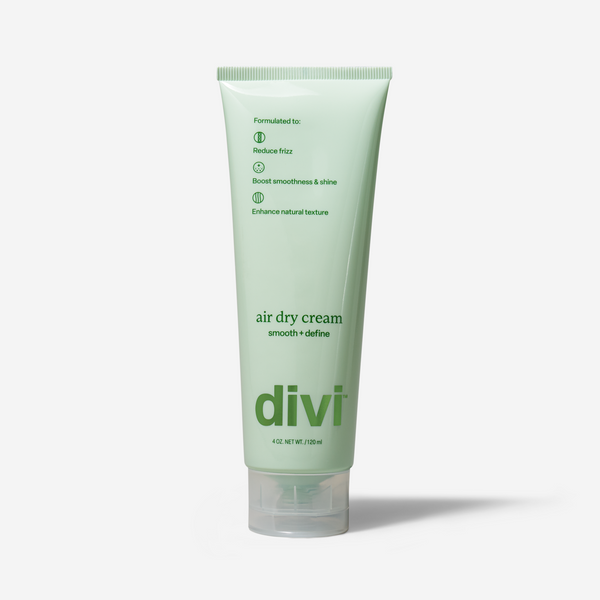
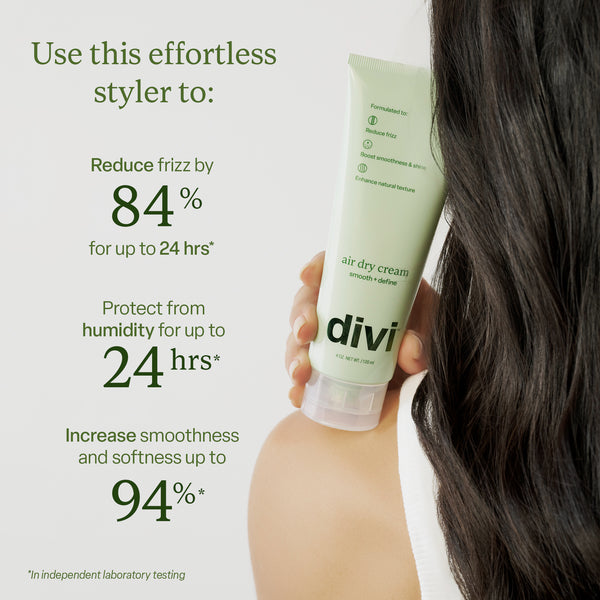

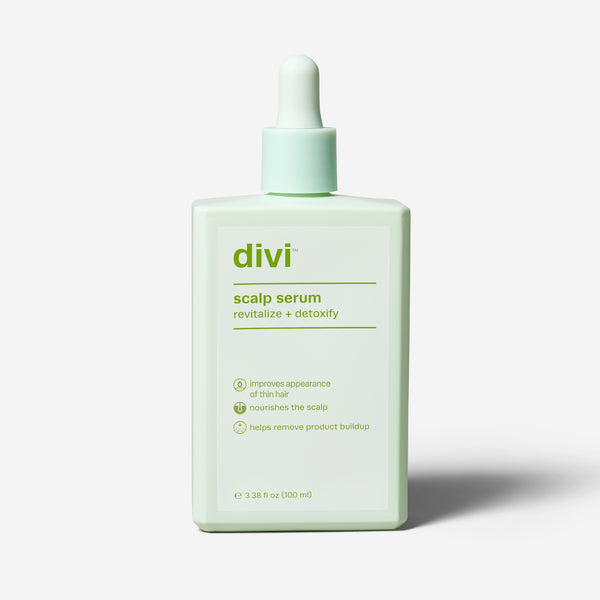

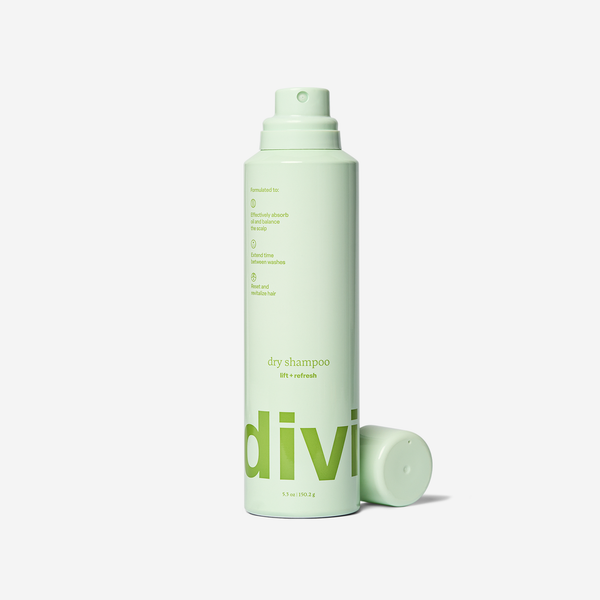

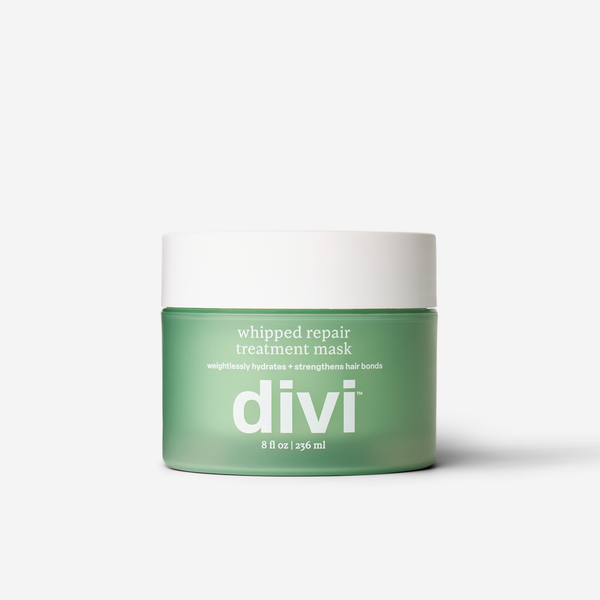
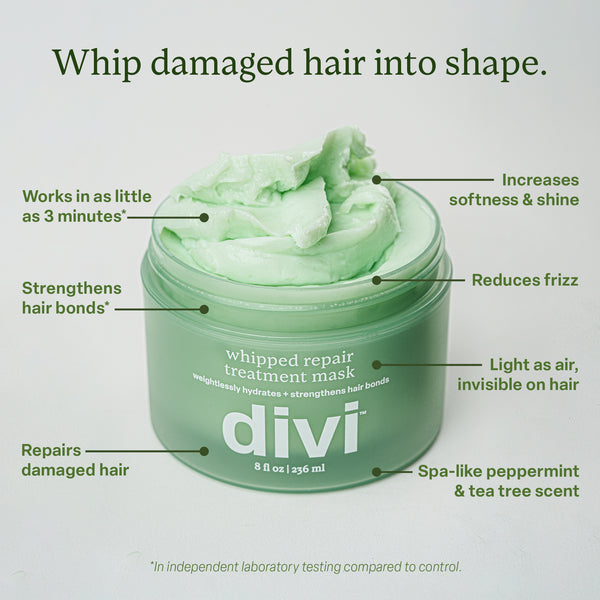
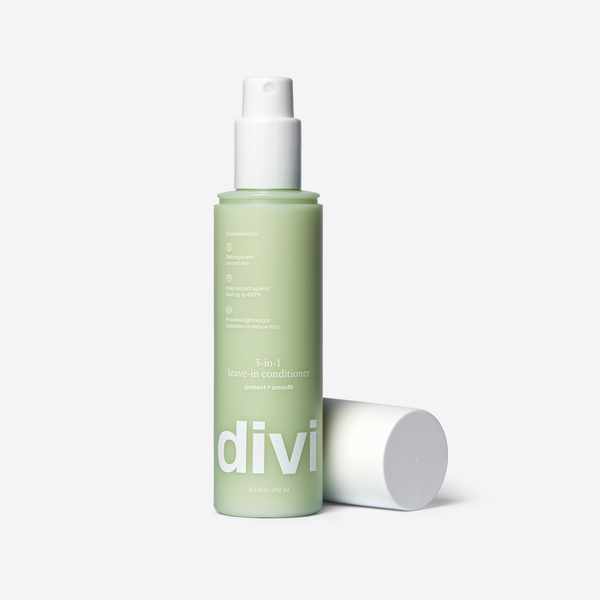



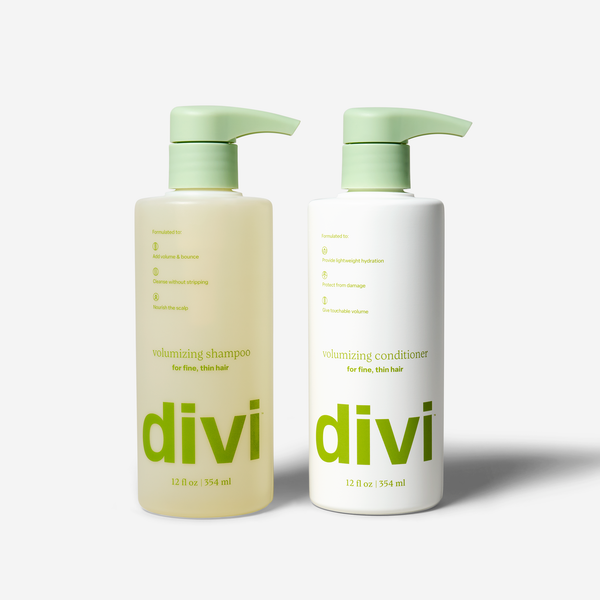






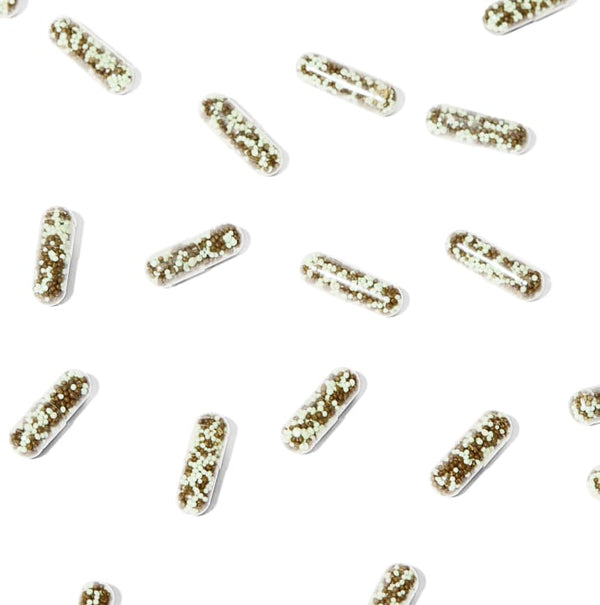
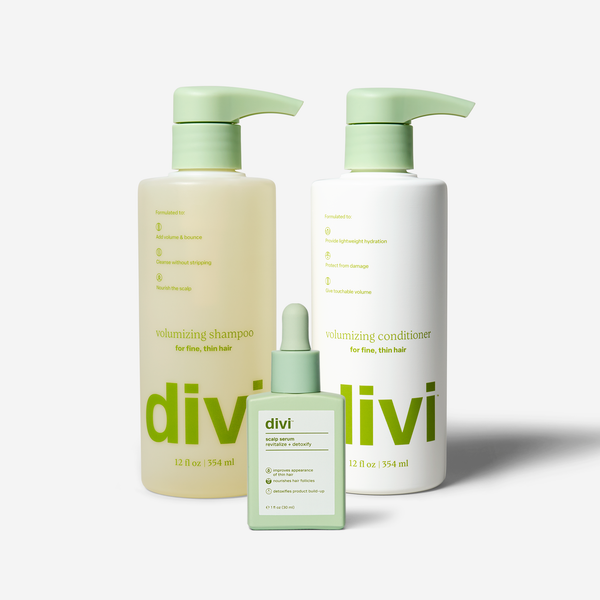












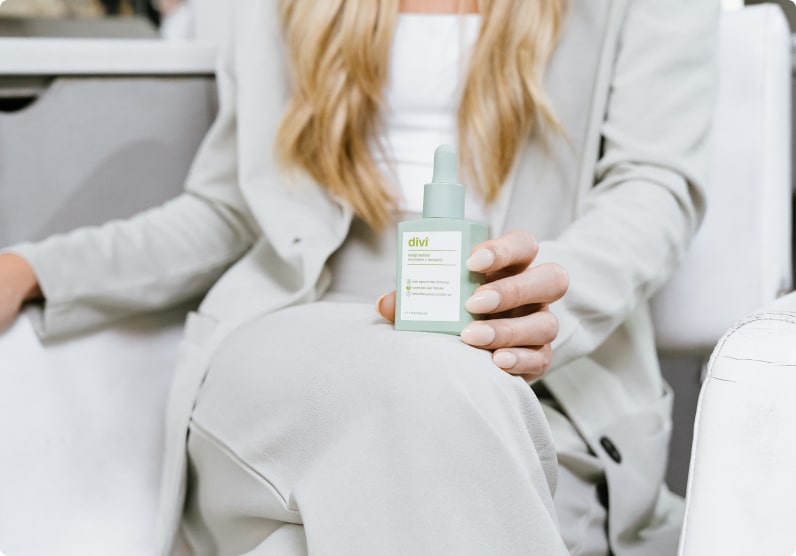






 30ml Scalp Serum
30ml Scalp Serum
 100ml Scalp Serum
100ml Scalp Serum
 Volumizing Shampoo
Volumizing Shampoo
 Hydrating Shampoo
Hydrating Shampoo
 Travel-Sized Volumizing Shampoo
Travel-Sized Volumizing Shampoo
 Travel-Sized Hydrating Shampoo
Travel-Sized Hydrating Shampoo
 Volumizing Conditioner
Volumizing Conditioner
 Hydrating Conditioner
Hydrating Conditioner
 Travel-Sized Volumizing Conditioner
Travel-Sized Volumizing Conditioner
 Travel-Sized Hydrating Conditioner
Travel-Sized Hydrating Conditioner
 3-in-1 Leave-In Conditioner
3-in-1 Leave-In Conditioner
 Best Sellers Bundle
Best Sellers Bundle
 Volumizing Starter Bundle
Volumizing Starter Bundle
 Hydrating Starter Bundle
Hydrating Starter Bundle
 The Healthy Hair Bundle
The Healthy Hair Bundle
 Hair Vitamins Trio
Hair Vitamins Trio
 Dry Shampoo
Dry Shampoo
 Hair Vitamins
Hair Vitamins
 Volumizing Shampoo & Conditioner
Volumizing Shampoo & Conditioner
 Travel-Sized Volume Duo
Travel-Sized Volume Duo
 Hydrating Shampoo & Conditioner
Hydrating Shampoo & Conditioner
 Travel-Sized Hydrating Duo
Travel-Sized Hydrating Duo
 Travel-Sized Dry Shampoo
Travel-Sized Dry Shampoo
 Travel-Sized Dry Shampoo Trio
Travel-Sized Dry Shampoo Trio
